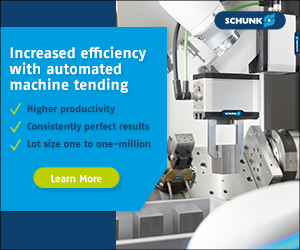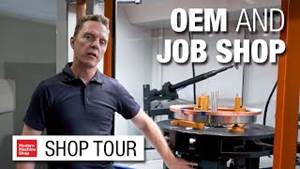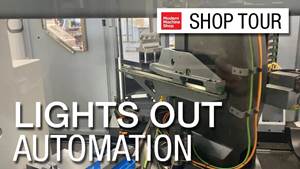Shop Tour Video: From Garage Shop to Leading Aerospace Supplier
From repairing aircraft interiors to manufacturing medical implants, Superior Joining Technologies excels at CNC machining, TIG welding, laser welding, and NADCAP-accredited nondestructive testing. Discover how this Rockford-based company supports the aerospace industry through a combination of advanced technologies.
Share




Autodesk, Inc.
Featured Content
View More






Superior Joining Technologies is a family-owned job shop that transformed from a humble garage startup into a key aviation, aerospace, and medical industry supplier. Founded and co-owned by husband-and-wife team Thomas Shelow and Teresa Beach-Shelow, the couple has dedicated 32 years toward building a reputation of quality and precision at their Rockford, Illinois business. Today, their AS9100-certified and NADCAP-accredited company blends advanced CNC machining, TIG welding, laser welding, and additive manufacturing to meet the rigorous demands of the industries they serve.
In this video, you’ll get an inside look at how the team tackles complex challenges — like reconditioning aircraft components and creating robust single-piece constructions — all while balancing innovation, compliance, and a family-focused work ethic. And you’ll discover how their unique blend of machining and welding expertise drives success in aerospace and beyond.
TRANSCRIPT:
Brent Donaldson: We are at Superior Joining Technologies, a family-owned job shop that primarily serves the commercial aviation industry. The couple that owns this business has been married for 47 years.
They perform CNC machining, TIG welding, laser welding, additive manufacturing, and nondestructive testing. Over the years, they have brought in these technologies in response to their customers’ needs.
This is a truly unique shop—let’s check it out.
Teresa Beach-Shelow: “We started in our garage. Yes, I had to move my car out, and it looked just like this. He’s had the vision of quality and precision the entire time for 32 years. Each time we moved the business, we grew five times. This is our fifth move, and each time we’ve gotten five times bigger.
Thomas Shelow: By the spring of 1992, we decided with some arm-twisting that now was the time to go out on our own. Neither one of us knew what that looked like. We didn't have mentors in our family. We weren't raised as entrepreneurs.
The things that we've brought into this organization have been intended to support the core competency of the welding.
So we do a lot of TIG welding and laser welding. We weld on people's parts. They bring them in, or we make stuff complete.
That's where the machine shop comes in. We saw this as an opportunity to enhance the relationships we have with customers by being able to contribute the machining side of it as well.
It gives us more control of lead times. That's important. And a bigger slice of the pie as well—a little more control over the job overall.
We brought in the machine shop about six, seven years ago, in 2018. We started talking to these guys. A lot of large five-axis milling centers. We did add the turning center that we've been really happy with.
Everything we're seeing right here is only from the last six, seven years.
Brent Donaldson: What types of industries and markets are you serving?
Thomas Shelow: Mainly with the machining side. The machines don't care, which is kind of a funny thing, but our organization is AS9100 registered. We're NADCAP-accredited for the welding and nondestructive testing that we do. So we are serving the commercial aviation industry. That's our focus. That's how we're set up. We do some medical and some other stuff. Like I said, the machines don't care, but it's all about compliance.
Brent Donaldson: Can you show us a couple of machines?
Thomas Shelow: We're developing this. It used to be a weldment of three different parts, and we convinced the customer to let us come up with this one-piece construction. It is much more robust and not subject to the problems, distortion, and challenges of the welding process. It used to be a flange and a tube and another flange, and there was a lot involved in making it. Now we're making that as a one-piece part.
Brent Donaldson: So you really need five-axis here to reach all of the different surfaces and geometries. Yes, oddly shaped part.
Thomas Shelow: These come from a customer that reconditions a lot of parts for cabin interiors. When these seat frames are damaged, they come to us. They'll send a group to us. We'll do some pre-machining to remove the damage. We'll weld to build up the area that's been removed and then do the finished machining.
We've reconditioned this area. This is the part where the armrest comes up and clicks into place. It gets torn up.
Brent Donaldson: So you guys really specialize in parts that require a marriage of operations between machining and welding?
Thomas Shelow: Yes. If it requires AS9100 or NADCAP accreditation, that's a bonus. If there's machining involved, that's great. We can do that in-house. We do the welding and also nondestructive testing.
We’re NADCAP-accredited for fluorescent dye penetrant, or FPI, as it's known in the industry, and magnetic particle inspection, or MPI. We do both of those.
We're a job shop, so we build relationships. We like reciprocal relationships where we're both customer and vendor with the people we work with.
We'll get anywhere from four to 104 parts. It's unpredictable. And they're always in a hurry when they show up.
Brent Donaldson: I see you have additive manufacturing written on this cart.
Thomas Shelow: I think somebody stole the cart.
This is one of the parts that we had historically been purchasing from an outside vendor. We have great vendors, but we had an opportunity to take a little more control of the lead time. We brought that in-house. The equipment is an amazing piece with phenomenal capability.
We’re working on another larger flange, and these all feed into the welding department.
This is a prototype for a local forging company. When they’re developing new products, they send them out for prototyping. You can see on the screen it's a hammer.
One key that I learned when we got into this was you can make little parts on big machines, but you can't make big parts on little machines. So we have a bunch of big machines, and we're making a lot of little parts. But every once in a while, somebody comes in with something huge, and we're ready for it.
Brent Donaldson: And then you're like, “See, I told you, we need this machine.”
Thomas Shelow: We talked about additive. This is one of our additive processes, the Concept Laser from GE. The goal is to be involved more in medical implantable devices.
This is the laser welding department where Morgan works. This machine also has the powder capability, the blown powder. It's a 900-watt fiber laser.
As a job shop, it’s a great machine for us because it's very open and flexible. Since we're not so dedicated to one part or a similar family of parts, we have to be ready for anything.
This machine really filled that niche. Being open like this, we have to keep it in this room because the wavelength of the laser is damaging to the eye.
We have a number of customers developing components for cabin interiors. We get involved in the water systems. This is a water tank for a very small aircraft. It has sensors, level sensors mounted here. The flange gets welded onto the tube. Other components are assembled to that.
Brent Donaldson: That is a beautiful welding job. Whoever’s doing that knows what they’re doing.
Thomas Shelow: You can see all the machined parts. We used to outsource all that stuff, but we’re bringing these things in-house.
Brent Donaldson: Are there any components on this tank not produced at the shop?
Thomas Shelow: The domes. These are made with spin forming. We work with several spin-forming suppliers.
This is our new five-axis laser. We bought one in 2008 and just installed this one this year.
We moved into this building in 2015. It’s been almost ten years, and we still have a lot of elbow room.
Because we’re in Rockford, Illinois, we hear from the big Tier 1s, and they told us we had to be ISO-certified and AS9100-certified.
For us, we go out to lunch every day and talk about work. If there’s an issue, we don’t go home. We’ll go out to dinner, and we don’t talk about work at home. For a long time, we didn’t even have computers at home. Anything work-related stayed at the shop. That allowed us to focus on each other, our family, and our friends. It’s made a wonderful life for us.
Brent Donaldson: Hey everybody, Brent Donaldson with Modern Machine Shop here. If you watched that video and thought, “I’d like my shop to be featured in the View From My Shop series,” send us an email at shopvideo@mmsonline.com and tell us what sets your shop apart.
Related Content
CNC Deburring OEM That Is Also A Job Shop
Take a look inside James Engineering, a high-end CNC Deburring OEM that became a job shop when they decided to produce their own parts in-house.
Read MoreInvesting in New Technology at AccuRounds
AccuRounds has created synergy between culture and technology, driving a commitment to customer satisfaction and continuous improvement.
Read MoreThe First American-Made Watch in a Half Century
In the latest episode of our View From My Shop series, MMS Editor-in-Chief Brent Donaldson visited the JN Shapiro Watches headquarters and production facility where Founder Joshua Shapiro—a history teacher turned watchmaker—realized his dream of "making a watch from scratch and everything in it."
Read MoreLights Out Machining With An Automated 5-Axis Cell
Legacy Precision Molds takes us on a tour of their moldbuilding facility. They've recently implemented two automated 5-axis cells for metal and graphite machining that run lights out during nights and weekends.
Read MoreRead Next
5 Rules of Thumb for Buying CNC Machine Tools
Use these tips to carefully plan your machine tool purchases and to avoid regretting your decision later.
Read MoreBuilding Out a Foundation for Student Machinists
Autodesk and Haas have teamed up to produce an introductory course for students that covers the basics of CAD, CAM and CNC while providing them with a portfolio part.
Read MoreSetting Up the Building Blocks for a Digital Factory
Woodward Inc. spent over a year developing an API to connect machines to its digital factory. Caron Engineering’s MiConnect has cut most of this process while also granting the shop greater access to machine information.
Read More





















.png;maxWidth=150)



















